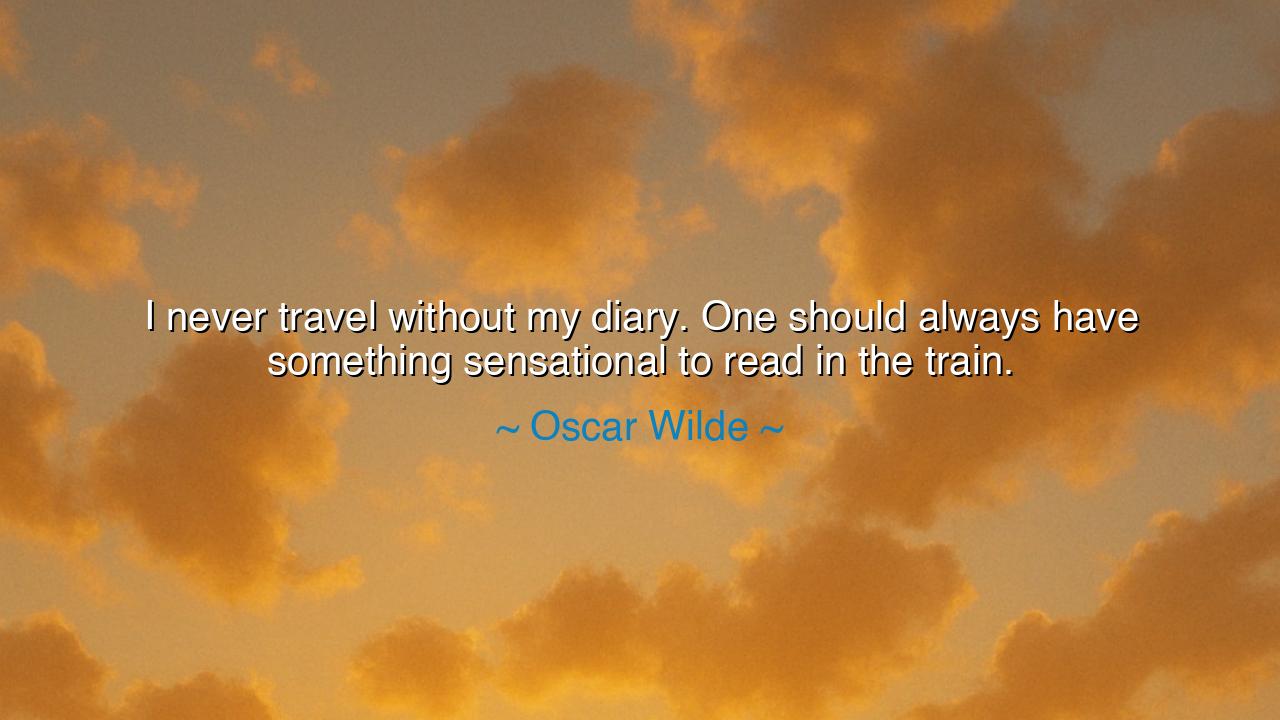
I never travel without my diary. One should always have
I never travel without my diary. One should always have something sensational to read in the train.






Hear now the playful yet piercing words of Oscar Wilde, master of wit and weaver of paradoxes: “I never travel without my diary. One should always have something sensational to read in the train.” Though draped in humor, these words conceal a deeper philosophy, for Wilde speaks not merely of the diary as an object, but of the self as a story worth reading. He suggests that our own lives, if lived with daring and imagination, should be more captivating than the novels of others.
The ancients, too, understood this truth in another form. When Marcus Aurelius wrote his Meditations, he did not intend them for others, but for himself—yet today, the world treasures them as one of the greatest guides to wisdom. His diary was his own mirror, his own companion, his own teacher. Wilde, in his way, reflects the same insight, though with wit rather than solemnity: the life worth living should also be a life worth recording, and the life worth recording should be a life worth reading.
To call the diary “sensational” is no accident. Wilde lived in an age of spectacle, of shifting fashions and glittering appearances, yet he sought to turn even private reflection into an art form. Where others filled journals with dull facts, he demanded brilliance. Thus, his quip reminds us: do not write lifeless lines in your diary—live so that your record is vivid, daring, even outrageous. The diary is not just a record of days, but a testament to how boldly we lived them.
Consider the story of Samuel Pepys, the Englishman whose diaries remain one of the greatest treasures of history. He wrote of kings and parliaments, but also of his own loves, fears, and follies. To him, the diary was not a simple log, but the unfolding drama of his life. When later generations opened his pages, they found not a dull chronicle, but something as “sensational” as Wilde demanded—an honest and vivid portrait of a human soul amidst the storms of history.
There is also in Wilde’s words a meditation on self-awareness. To read one’s own diary is to encounter oneself as though one were another person, to see one’s thoughts made strange by time, to find both folly and brilliance in one’s past self. The train journey becomes a metaphor: as we move forward into the future, we read what we have left behind. In this way, the diary is not just entertainment, but a tool of reflection, a means of traveling not only across land but across memory and spirit.
The lesson, then, is clear: live a life that is worthy of record. Do not pass through days in dull repetition, but seek to fill them with color, with courage, with experiences that your future self will read with awe. Write down your days not merely to remember them, but to sharpen them, to honor them, to give them weight. For the act of recording reminds us that time is precious, and that each day should bear something worthy of ink.
Practically, this means cultivating both daring and discipline. Live boldly enough to give your diary something worth holding, but also write faithfully enough to preserve it. Do not fear to put down your triumphs, your failures, your confessions, your passions. For in those words you will find not only entertainment on the train, but a compass for the journey of your life.
So let Wilde’s words endure: “One should always have something sensational to read in the train.” Let your life itself be the book that dazzles, and your diary the record of a soul that refused mediocrity. For the world has many dull volumes, but only you can write the one that bears your name—a book both sensational and true.






AAdministratorAdministrator
Welcome, honored guests. Please leave a comment, we will respond soon